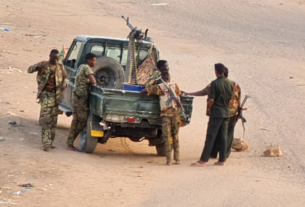South Africa and other nations yet to take action should endorse a widely supported political declaration aimed at safeguarding civilians from bombings and shelling in populated areas. Human Rights Watch (HRW) made this appeal following a regional meeting on the issue held in Johannesburg on February 27-28, 2025.
The use of explosive weapons in populated areas has devastating humanitarian consequences, often leading to mass civilian casualties and long-term destruction. Despite global efforts to curb these attacks, many countries have not yet committed to a formal stance against this method of warfare.
“South Africa has taken a strong, principled position in condemning the devastating impact caused by today’s armed conflicts and in supporting accountability for serious violations of the laws of war,” said Ida Sawyer, crisis, conflict, and arms director at HRW. She urged the South African government to reinforce its stance by endorsing the declaration on explosive weapons and encouraging other regional governments to do the same.
Austria, Ireland, and several other governments initiated the political declaration in 2019 in response to growing concerns over civilian harm caused by explosive weapons. After years of negotiations, the declaration was officially opened for endorsement in November 2022.
More than 80 countries have already endorsed the agreement, demonstrating widespread global support for limiting the use of explosive weapons in civilian areas. However, key nations, including South Africa, have yet to make a formal commitment despite their history of advocating for human rights and international law.
Armed conflicts in recent years have highlighted the urgent need for restrictions on bombing and shelling in urban settings. In conflicts from Syria to Ukraine, the use of explosive weapons has led to catastrophic civilian deaths, displacement, and destruction of vital infrastructure.
HRW and other humanitarian organizations argue that endorsing the declaration would not only reinforce South Africa’s commitment to human rights but also strengthen international efforts to prevent unnecessary civilian suffering. They emphasize that political declarations play a crucial role in shaping future military conduct and policy.
The declaration commits endorsing states to take action to limit or avoid the use of explosive weapons in populated areas. It also calls for assistance to victims and efforts to rebuild affected communities after conflict-related destruction.
HRW has urged South Africa to use its influence in Africa to encourage neighboring countries to support the declaration. Regional cooperation is seen as essential in building a united front against the indiscriminate use of explosive weapons.
South Africa has previously played a leading role in advocating for global peace initiatives and disarmament efforts. However, its reluctance to endorse this declaration raises concerns about its commitment to protecting civilians in wartime.
Human rights advocates argue that failure to endorse the agreement could weaken South Africa’s standing as a champion of humanitarian causes. They stress that clear, actionable policies are needed to protect civilians and prevent war crimes.
Governments endorsing the declaration are not legally bound but commit to implementing stronger policies to reduce civilian harm in conflict zones. Supporters argue that political will and international pressure can drive meaningful change in warfare practices.
South Africa’s decision on the declaration could influence other countries in the region, potentially leading to broader adoption across Africa. Analysts say that a strong stance from South Africa would send a powerful message about the importance of civilian protection.
With the Johannesburg meeting highlighting regional concerns, advocacy groups hope South Africa will take decisive action. They believe a formal endorsement would align the country with global efforts to mitigate the impact of war on civilian populations.
As conflicts worldwide continue to cause large-scale civilian casualties, organizations like HRW stress the importance of global cooperation. They urge all governments to prioritize civilian safety by endorsing and implementing measures against the use of explosive weapons in populated areas.




